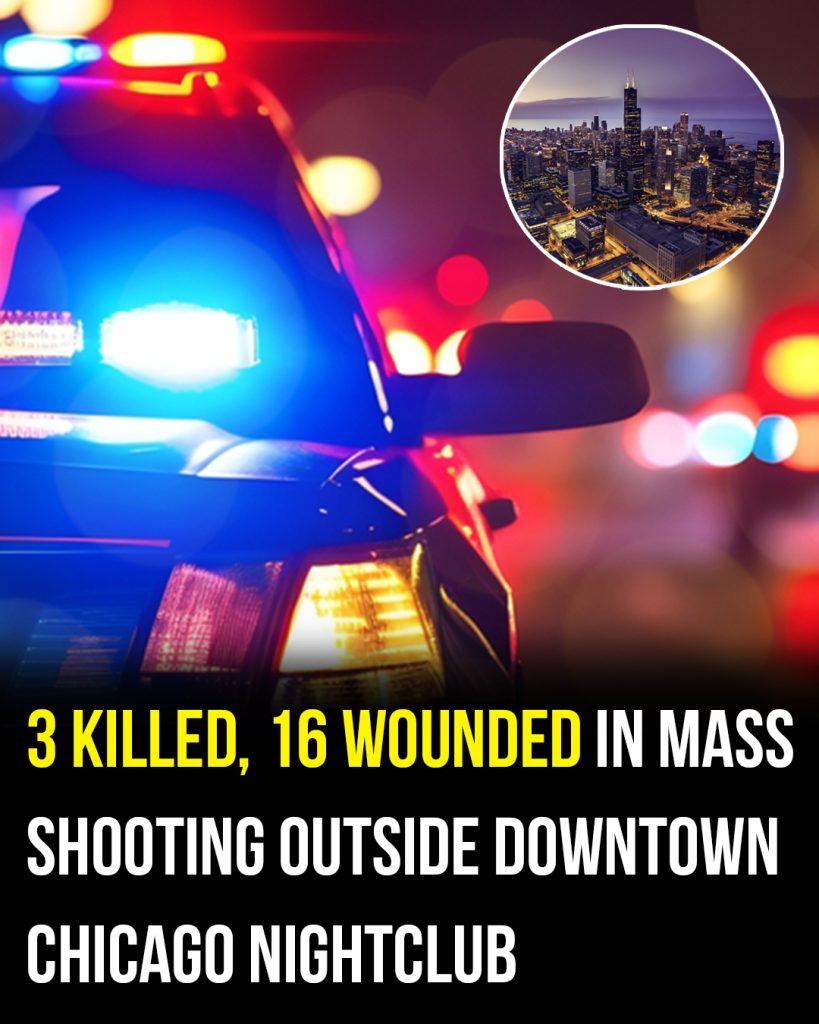On what should have been a night filled with celebration and music, horror took center stage in Chicago’s River North neighborhood. Just before midnight on Wednesday, gunfire erupted outside Artis Lounge, a popular nightclub located in the 300 block of West Chicago Avenue. The chaos turned a local rapper’s album release party into a scene of tragedy, leaving at least three people dead and sixteen others wounded in what authorities have described as a “targeted attack.”

The violence unfolded shortly after the party for Mello Buckzz, a rising artist from Chicago, had concluded. As partygoers began to exit the venue and spill onto the street, a vehicle approached, and someone inside opened fire on the crowd. In mere moments, the celebration was transformed into panic and bloodshed. Witnesses reported hearing rapid gunfire followed by screams as people ran for cover.
Authorities responded quickly, but the damage had already been done. Nineteen people had been shot, according to city officials—three of them fatally. The identities of the victims have not yet been publicly released, pending notification of their families. Emergency crews rushed the injured to several area hospitals, where they continue to receive treatment. Chris King, a representative from Northwestern Medicine, confirmed that several of the victims were being treated in their emergency department, though he declined to disclose how many patients were admitted or share specifics about their conditions, citing privacy concerns.
At a press briefing, Chicago Police Officer Julio Garcia stated that the investigation is still ongoing and more details will be shared as they become available. He urged the public to come forward with any information that might help identify the perpetrator or shed light on the motive behind the attack.
“This was a targeted shooting,” a city official emphasized, suggesting that the gunman may have intended to hit a specific individual or group among the crowd. However, that has offered little comfort to a community grappling with yet another act of senseless violence.
The location of the shooting has made the incident all the more tragic. It’s not the first time that block has been the scene of a deadly shooting. In November 2022, when the venue was still operating under the name Hush Lounge, a similar outbreak of violence occurred. In that incident, a fight broke out involving a group that had been ejected from the club. Shots were fired, leaving one person dead and three others injured. In response, the city moved swiftly to shut down Hush Lounge, hoping to prevent future violence.
Following the closure, Artis Lounge took over the same space, rebranding and working to offer a safe and enjoyable nightlife experience. But Wednesday night’s tragedy has reopened old wounds and reignited fears about the safety of nightlife venues in Chicago, especially in neighborhoods that have already experienced gun violence.
City officials have confirmed that they are exploring whether there is any connection between the two shootings or whether Wednesday’s incident is tied to ongoing gang-related activity. As of Thursday morning, no arrests had been made, and the suspect or suspects remain at large. Investigators are reviewing surveillance footage from the area and speaking to witnesses, hoping to gather enough evidence to make an arrest.
The community reaction has been a mix of grief, anger, and frustration. Locals have taken to social media and community forums to express condolences to the victims’ families and to demand accountability—not just for the shooter but also for the systems that have allowed this type of violence to persist.
“I’m heartbroken, but I’m not surprised,” said a local resident who lives just a few blocks away from the scene. “We’ve seen this happen before. How many more people have to die before something changes?”
Others are calling for stronger security measures at clubs and bars, including more rigorous ID checks, bag searches, and the presence of trained security personnel both inside and outside venues. Some are also pushing for increased police patrols in nightlife areas during peak hours.
However, others caution against reactive policing and instead urge the city to address the root causes of violence. They point to poverty, lack of opportunity, and systemic neglect as underlying factors that continue to fuel gun-related crimes in many Chicago neighborhoods. They argue that long-term solutions must include investment in education, mental health services, community programs, and economic development.
Mayor Brandon Johnson issued a brief statement expressing his condolences and vowing to support the ongoing investigation. “My heart goes out to the victims, their families, and the entire River North community. We must do everything in our power to bring those responsible to justice and to prevent tragedies like this from happening again.”
In the wake of the shooting, Artis Lounge has closed temporarily and is cooperating fully with investigators. The club’s management released a statement on social media, saying: “We are devastated by the events that took place outside our venue. Our thoughts are with the victims and their families. We are working closely with law enforcement to assist in every way we can.”
As the investigation continues, residents and city leaders alike are left to grapple with difficult questions. How do you preserve vibrant nightlife while ensuring public safety? What more can be done to prevent guns from ending up in the wrong hands? And how do you restore a sense of peace in communities that have been repeatedly shaken by violence?
One thing is clear: for those who were present that night, and for the families who lost loved ones, the scars of this tragedy will not fade quickly. A night that should have been a celebration of local talent and community pride became yet another reminder of the city’s ongoing struggle with gun violence. And as Chicago mourns yet again, the call for meaningful change grows louder.





